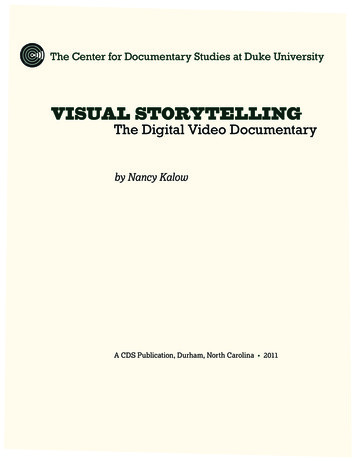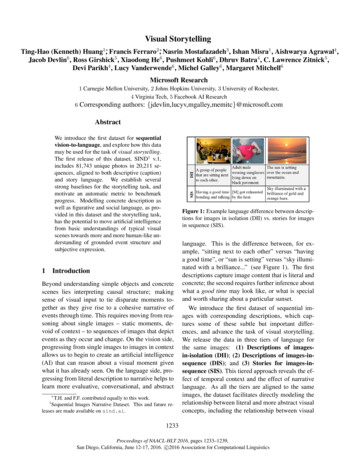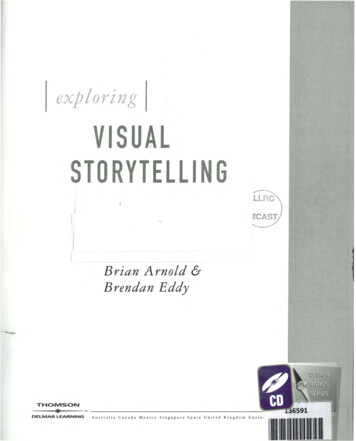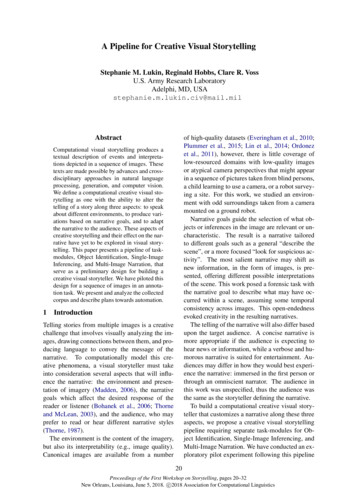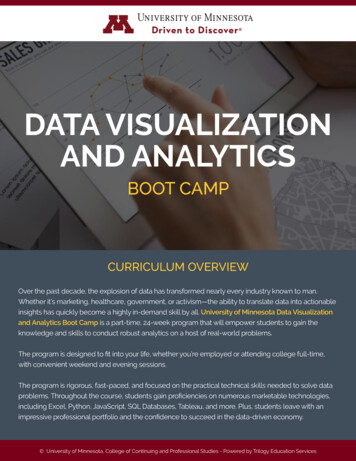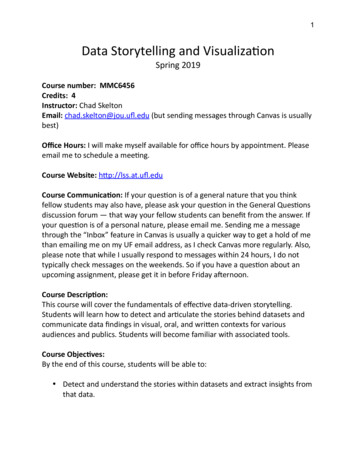
Transcription
1Data Storytelling and VisualizationSpring 2019Course number: MMC6456Credits: 4Instructor: Chad SkeltonEmail: chad.skelton@jou.ufl.edu (but sending messages through Canvas is usuallybest)Office Hours: I will make myself available for office hours by appointment. Pleaseemail me to schedule a meeting.Course Website: http://lss.at.ufl.eduCourse Communication: If your question is of a general nature that you thinkfellow students may also have, please ask your question in the General Questionsdiscussion forum — that way your fellow students can benefit from the answer. Ifyour question is of a personal nature, please email me. Sending me a messagethrough the “Inbox” feature in Canvas is usually a quicker way to get a hold of methan emailing me on my UF email address, as I check Canvas more regularly. Also,please note that while I usually respond to messages within 24 hours, I do nottypically check messages on the weekends. So if you have a question about anupcoming assignment, please get it in before Friday afternoon.Course Description:This course will cover the fundamentals of effective data-driven storytelling.Students will learn how to detect and articulate the stories behind datasets andcommunicate data findings in visual, oral, and written contexts for variousaudiences and publics. Students will become familiar with associated tools.Course Objectives:By the end of this course, students will be able to: Detect and understand the stories within datasets and extract insights fromthat data.
2 Effectively present data visually to enhance audience comprehension offindings and insights. Apply data visualization best practices to their work, including choosing theright chart type for the situation and avoiding visualization techniques thatcan mislead an audience. Act as a data-driven visual storyteller for optimal presentation of trends,patterns and insights. Effectively communicate insights about data in various formats, includingoral presentations, written reports and interactive visualizations. Prepare professional business reports and make effective clientpresentations of their work. Find and download public data from open data portals such as data.gov anddata.un.org. Analyze datasets visually using Tableau Desktop. Create static charts, interactive Dashboards and data stories using TableauDesktop. Explain the importance of communication skills and competencies forindividuals who serve as data analysts.Course Goal:This course teaches students the skills necessary to be effective Data Storytellers.They will learn how to locate and download datasets, extract insights from thatdata and present their findings in a variety of different formats. Students will learnhow to “connect the dots” in a dataset through visual data analysis and find thenarrative thread that both explains what’s going on and engages their audience ina story about the data. Moreover, students will learn how to tell data stories indifferent ways for different audiences and stakeholders.Expectations:Students are expected to complete all assigned readings and recorded lectures, tosubmit their assignments on time and to participate in class discussions in aprofessional manner while respecting the instructor and fellow students.
3Required Texts: Storytelling with Data: A Data Visualization Guide for BusinessProfessionals by Cole Nussbaumer Knaflic (ISBN: 9781119002253) Tableau Your Data!: Fast and Easy Visual Analysis with Tableau Software(1st or 2nd Edition) By Daniel Murray (ISBN: 9781119001195) Selected readings (i.e. chapters from other books) will be made availablethrough the Course Reserves system of the UF Libraries in Canvas. Note:Access to the Course Reserves system (ARES) can be browser-sensitive. Ifyou have Internet Explorer (IE) Edge or later, it may not open. Werecommend an older version than Edge, or use Mozilla or Chrome.Both Storytelling with Data and Tableau Your Data! are available in electronicformat for free through the UFL library:http://cms.uflib.ufl.edu/If you wish to purchase paper copies of either book, you can find them onAmazon.com re/dp/1119001196/Required Software and Hardware:Tableau Desktop (a free academic license is available to UF students athttps://www.tableau.com/academic/students) PowerPoint A webcam (to record assignments) A computer microphone (to record assignments; a built-in laptop mic isfine) Additional Readings:Listed in the course schedule and in each weekly module on Canvas
4Prerequisite knowledge and skills:Students are expected to have a basic familiarity with Excel and with the conceptof structured data (i.e. storing data in columns and rows).Teaching Philosophy:The instructor believes that hands-on learning is the most effective way to learndata storytelling and visualization skills. While students will be given a strongfoundation in data visualization principles through various readings, lectures willbe focused on concrete skills that students will then implement in their own work.Instructional Methods:Each week, there will be several recorded lectures, readings and videopresentations from other sources. I recommend you watch the lectures first.That’s because, in some cases, the readings will reinforce the lessons in thelectures and — depending on how comfortable you feel with what was taught inthe lectures – you may be able to skim some sections of the readings. This isparticularly true for readings from Tableau Your Data!, which is provided tostudents primarily as a reference work and whose material will often reinforcesimilar skills as will be covered in the recorded lectures.To encourage productive class discussions, it is essential that all students keep upwith the recorded lectures, readings and videos assigned in this class each week.With that in mind, each week, you will be required to complete a short online quizthat will be based on those assigned readings, lectures and videos.All students will be expected to participate each week in the online discussionboards (more details below).Course Policies:Attendance Policy:Because this is an online asynchronously delivered course, attendance in the formof calling roll will not occur; however, students are expected to sign onto the
5course site at least once each day, Monday – Friday, to check for course updates inthe announcements and discussion sections of the site.Late Work and Make-up Policy:Deadlines are critical to this class. All work is due on or before the due date.Extensions will only be granted in exceptional circumstances (i.e. serious illness,death of a close family member) and may require proof (like a doctor’s note).Requests for extensions, whenever possible, should be made well in advance ofthe assigned due date. Minor inconveniences such as family vacation or minorillness are not valid reasons for extensions. With that in mind, there will bepenalties for late work: Less than an hour lateMore than an hour but less than 48 hours lateMore than 48 hours lateA week or more late10 percentage points off25 percentage points off50 percentage points offNot accepted at allPlease note that all late penalties are in percentage points, not percentages. Thatmeans an assignment that would normally get 80% handed in five days late wouldget 30% (80% minus 50 percentage points) not 40% (half of 80%).Each new lecture week begins on Mondays and ends on Sundays.Requirements for class attendance and make-up exams, assignments, and otherwork in this course are consistent with university policies that can be found in theonline catalogue ns/info/attendance.aspxCoursework:Coursework should be submitted through Canvas.Deadlines:Each week’s module begins on Monday morning. All discussion board posts,quizzes and assignments for that week are due before 11:59pm Eastern Standard
6Time on the following Sunday, with the exception of discussion board replies,which are due the Tuesday after that.Issues with uploading work for a grade is not an excuse. If a student is havingtechnical difficulties with Canvas, there are other means to submit completedwork. Student may email .zip files or even links to Dropbox folders to Instructor viaUF email. Students should compensate for technical difficulties by not waitinguntil the last minute to submit work.Extensions due to technical issues: Any requests for make-ups due to technicalissues MUST be accompanied by the ticket number received from LSS when theproblem was reported to them. The ticket number will document the time anddate of the problem. You MUST e-mail your instructor within 24 hours of thetechnical difficulty if you wish to request a make-up. Contact UF helpdesk (352)392-HELP.Emergency and extenuating circumstances policy: Students who faceemergencies, such as a major personal medical issue, a death in the family, seriousillness of a family member, or other situations beyond their control should notifytheir instructors immediately.Students are also advised to contact the Dean of Students Office if they would likemore information on the medical withdrawal or drop rawal-process/ .Students MUST inform their academic advisor before dropping a course,whether for medical or non-medical reasons. Your advisor will assist with notifyingprofessors and go over options for how to proceed with their classes. Youracademic advisor is Tiffany Robbert, and she may be reachedat trobbert@jou.ufl.edu .Requirements for class attendance and make-up exams, assignments, and otherwork in this course are consistent with university policies that can be found in theonline catalogue ns/info/attendance.aspx
7Grading:Your work will be evaluated according to this distribution: Discussions (12 Total) Weekly Quizzes (11 total)10% Assignmentso Data Plano Two charts, a “lead” and an “elevator pitch”o Narrated PowerPoint Slide Decko Data Memo (Written Report)o Interactive Data Story20%10%10%15%15%20%The final grade will be awarded as follows:AAB BBC CCD DDF100% 92.5% 89.5% 86.5% 82.5% 79.5% 76.5% 72.5% 69.5% 66.5% 62.5% pxWeekly Lectures:The Instructor will post lecture videos to Canvas for each of the 12 weeks of thecourse and two additional videos – one is an introduction to the course andcourse topic and the other will cover the syllabus. These videos will vary in lengthdepending on the material. It is your responsibility to watch each of the videos.
8Assignments:Weekly Quizzes (10% of Final Grade)Each week, you will be required to complete a short online quiz that will be basedon that week’s assigned lectures and readings.Each quiz will contain five multiple choice and true/false questions and will have atime limit of 10 minutes. The quiz is open book but is recommended you do thequiz only after you have watched all of that week’s lectures and done all theassigned readings.The quiz will be due at 11:59pm Eastern time on the Sunday of each weeklymodule.Discussions (20% of Final Grade)All students will be expected to participate each week in the online discussionboards. Each week’s discussion question or topic will be posted on Canvas on theMonday of each weekly module. Your initial post responding to that questionshould be posted in Canvas no later than 11:59pm Eastern time on Sunday.However, any replies to other students’ posts are not due until 11:59 pm Easterntime on the following Tuesday (to allow a bit of extra time for replies). So, forexample, your post in response to a question in Week 2 is due that Sunday butyour replies to other students’ Week 2 posts are not due until the Tuesday ofWeek 3.As a general rule, the instructor will refrain from commenting on a students’discussion post until at least one other student has done so first. The hope is thiswill encourage students to think critically about each others’ work rather thanwaiting to first see what the “right” answer is from the instructor.The discussions will fall into one of the three broad areas: Answering discussion questions posed by the instructor, inspired by thatweek’s readings and lectures. You will be required to post an answer to theinstructor’s question, in roughly 250 words, as well as respond to at least
9two of your fellow students’ posts. Your replies should be roughly 150words each. You are free to contribute more responses if you wish. Providing feedback on fellow students’ assignments-in-progress. Forexample, you may be expected to share one of the charts from yourNarrated PowerPoint Slide Deck the week before the assignment is due andthen comment on at least two of your fellow students’ charts. Thesecomments should be at least 150 words in length. Mini-assignments, such as finding a chart online and writing a brief critiqueof it or participating in “Makeover Monday”, in which participants take anexisting chart and redesign it using Tableau. In the case of miniassignments, you will be expected to both post your own assignment andrespond to at least one of your fellow student’s assignments. Word countsfor the mini-assignments will vary and will be included when assigned.Data Plan (10% of final grade)Your Data Plan should be submitted through Canvas as a Word document (.doc or.docx).Find a dataset that will serve as the basis for the other assignments in this course(Narrated PowerPoint Slide Deck, Data Memo and Interactive Data Story). Thisdataset can be located on an open data portal or can be a dataset that you haveaccess to through your work. The dataset can be on any topic you choose —ideally, pick one that’s about something you’re interested in and/or is aboutwhere you live.
Required Texts: Storytelling with Data: A Data Visualization Guide for Business Professionals by Cole Nussbaumer Knaflic (ISBN: 9781119002253) Tableau Your Data!: Fast and Easy Visual Analysis with Tableau Software (1st or 2nd Edition) By Daniel Murray (ISBN: 9781119001195) Selected readings (i.e. chapters from other books) will be made available


